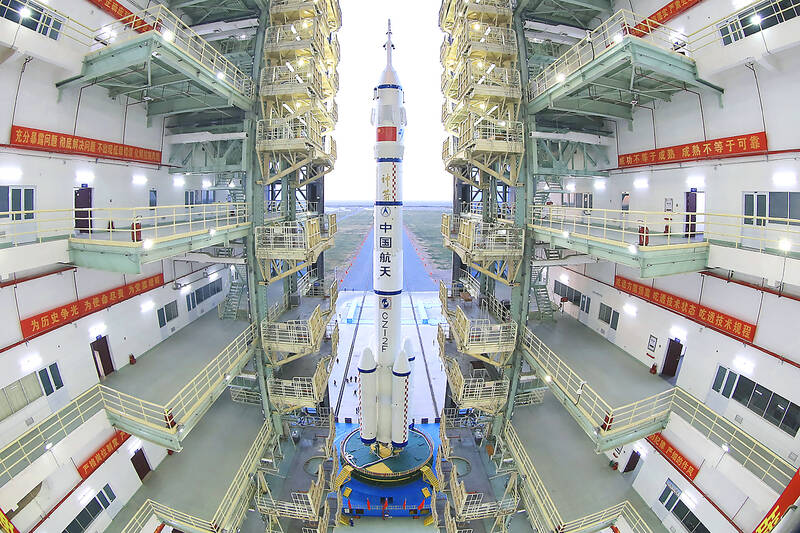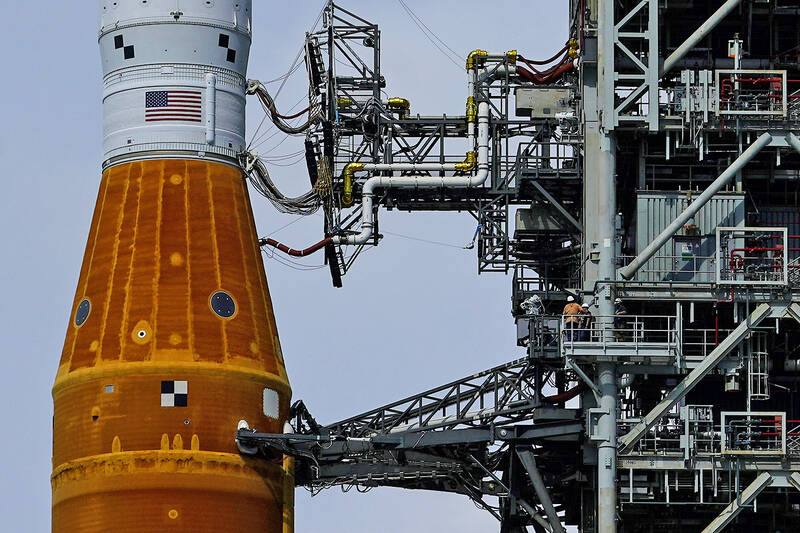It is not just rocket fuel propelling the US’ first moonshot after a half-century lull. Rivalry with China’s flourishing space program is helping drive NASA’s effort to get back into space in a bigger way as both nations push to put people back on the moon and establish the first lunar bases.
US intelligence, military and political leaders make clear that they see a host of strategic challenges to the US in China’s space program, in an echo of the US-Soviet rivalry that prompted the 1960s’ race to the moon.
That is as China is quickly matching US civil and military space accomplishments, and notching new ones of its own.

Photo: AP
On the military side, the US and China trade accusations of weaponizing space.
Senior US defense officials warn that China and Russia are building capabilities to take out the satellite systems that underpin US intelligence, military communications and early warning networks.
There is also a civilian side to the space race.

Photo: AP
The US is wary of China taking the lead in space exploration and commercial exploitation, and pioneering the technological and scientific advances that would put China ahead in power in space and in prestige on Earth.
“In a decade, the United States has gone from the unquestioned leader in space to merely one of two peers in a competition,” US Senator Jim Inhofe said this week at a US Senate Armed Services hearing. “Everything our military does relies on space.”
At another hearing last year, NASA Administrator Bill Nelson brandished an image transmitted by a Chinese rover that had just plunked down on Mars.
“The Chinese government ... they’re going to be landing humans on the moon” soon, Nelson said. “That should tell us something about our need to get off our duff.”
NASA is awaiting a new launch date this month or next month for its Artemis I uncrewed test moonshot. Technical problems scrubbed the first two launch attempts in the past few weeks.
China likewise aims to send astronauts to the moon this decade, as well as establish a robotic research station there.
The US and China intend to establish bases for intermittent crews on the moon’s south pole after that.
Russia has aligned with China’s moon program, while 21 nations have joined a US-initiated effort meant to bring guidelines and order to the civil exploration and development of space.
The parallel efforts come 50 years after US astronauts last pulled shut the doors on an Apollo module and blasted away from the moon, in December 1972.
Some space policy experts bat down talk of a new space race, seeing big differences from then-US president John F. Kennedy’s Cold War drive to outdo the Soviet Union’s Sputnik and be the first to get people on the moon.
This time, the US and China see moon programs as a stepping stone in phased programs toward exploring, settling and potentially exploiting the resources, and other untapped economic and strategic opportunities offered by the moon, Mars and space at large.
Beyond the gains in technology, science and jobs that accompany space programs, Artemis promoters point to the potential of mining minerals and frozen water on the moon, or using the moon as a base to go prospecting on asteroids.
The administration of former US president Donald Trump in particular emphasized the mining prospects.
There is potential in tourism and other commercial efforts.
And for space more broadly, Americans alone have tens of thousands of satellites overhead in what the US Space Force says is a US$500 billion global space economy.
Satellites guide GPS, process credit card purchases, help keep TV, radio and cellphone feeds going, and predict weather. They ensure the military and intelligence community’s ability to keep track of perceived threats.
In a world where China and Russia are collaborating to try to surpass the US in space, and where some point to private space efforts led by US billionaires as rendering costly NASA rocket launches unnecessary, Washington would regret leaving the glory and strategic advantages from developing the moon and space solely to the likes of Chinese President Xi Jinping (習近平) and Tesla magnate Elon Musk, Artemis proponents say.
The moon programs signal that “space is going to be an arena of competition on the prestige front, demonstrating advanced technical expertise and know-how, and then also on the military front as well,” said Aaron Bateman, a professor of history and international affairs at George Washington University and a member of the Space Policy Institute.
“People who are supportive of Artemis and people who see it as a tool of competition, they want the United States to be at the table in shaping the future of exploration on other celestial bodies,” Bateman said.

TIT-FOR-TAT: The arrest of Filipinos that Manila said were in China as part of a scholarship program follows the Philippines’ detention of at least a dozen Chinese The Philippines yesterday expressed alarm over the arrest of three Filipinos in China on suspicion of espionage, saying they were ordinary citizens and the arrests could be retaliation for Manila’s crackdown against alleged Chinese spies. Chinese authorities arrested the Filipinos and accused them of working for the Philippine National Security Council to gather classified information on its military, the state-run China Daily reported earlier this week, citing state security officials. It said the three had confessed to the crime. The National Security Council disputed Beijing’s accusations, saying the three were former recipients of a government scholarship program created under an agreement between the

Sitting around a wrestling ring, churchgoers roared as local hero Billy O’Keeffe body-slammed a fighter named Disciple. Beneath stained-glass windows, they whooped and cheered as burly, tattooed wresters tumbled into the aisle during a six-man tag-team battle. This is Wrestling Church, which brings blood, sweat and tears — mostly sweat — to St Peter’s Anglican church in the northern England town of Shipley. It is the creation of Gareth Thompson, a charismatic 37-year-old who said he was saved by pro wrestling and Jesus — and wants others to have the same experience. The outsized characters and scripted morality battles of pro wrestling fit

SUSPICION: Junta leader Min Aung Hlaing returned to protests after attending a summit at which he promised to hold ‘free and fair’ elections, which critics derided as a sham The death toll from a major earthquake in Myanmar has risen to more than 3,300, state media said yesterday, as the UN aid chief made a renewed call for the world to help the disaster-struck nation. The quake on Friday last week flattened buildings and destroyed infrastructure across the country, resulting in 3,354 deaths and 4,508 people injured, with 220 others missing, new figures published by state media showed. More than one week after the disaster, many people in the country are still without shelter, either forced to sleep outdoors because their homes were destroyed or wary of further collapses. A UN estimate

Australia’s opposition party yesterday withdrew election promises to prevent public servants from working from home and to slash more than one in five federal public-sector jobs. Opposition leader Peter Dutton announced his conservative Liberal Party had dropped its pledge that public servants would be required to work in their offices five days a week except in exceptional circumstances. “I think we made a mistake in relation to this policy,” Dutton told Nine Network television. “I think it’s important that we say that and recognize it, and our intention was to make sure that where taxpayers are working hard and their money is